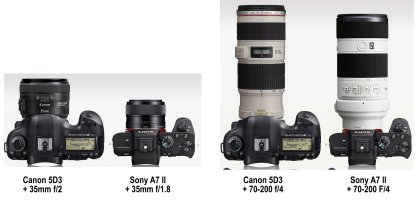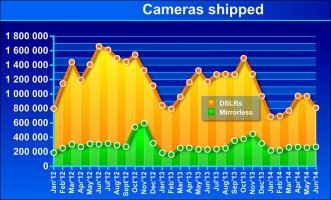Luds34 said:Personally I feel like a mirrorless system with a crop size sensor might just be the sweet spot of compact size (travel kit) while still capable of good IQ, bokeh (when desired), low light performance (when needed).
If/when Canon wants to go full frame mirrorless, they don't have to abandon the EF mount. The latest Sony A7II isn't even all that small of a camera body, pushing DSLR size. Mount some good glass and the size advantage has essentially disappeared.
For now, I'd just like to see Canon embrace the EF-M system and compete with a nice compact, mirrorless kit for travel, casual use, out with the family, etc. I can bust out the 6D/70D when I want to feel like a pro.
All good points.
This is the quandary of mirrorless -- there's a crushing tradeoff w.r.t. sensor size.
Smaller sensors with native glass that is optimized for the smaller flange distance leads to a compact rig which is attractive to a larger market of users.
Larger sensors have stellar IQ, but once you climb out of (say) 50mm FL or longer, any thinner-than-SLR upside you get from mirrorless becomes hard to appreciate -- the lenses are still about the size of SLR FF glass. See picture for what I mean. Such products are clearly only for professionals and well-heeled enthusiasts.
So if a company believes the sole opportunity mirrorless offers is to take pictures as well as an SLR in a smaller package, they should probably not go larger than APS-C and aim to defeat the feature-equivalent consumer SLR they are up against (the T6i, the D5500, etc.).
But if a company wants to take over the SLR market, you kind of need to roll up your sleeves and start building an epic portfolio of lenses to start to rival the EF and FX glass that's out there. Because now you are up against Canon and Nikon's strongest turf and you can't swing pros with only a handful of lenses.
- A
Attachments
Upvote
0


